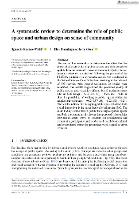Abstract
The aim of this research is to determine the effect that the
physical characteristics of public spaces and their perceived
quality have on residents’ sense of community (SoC). A sys tematic review was carried out following the protocol of the
PRISMA guidelines; a systematic search was conducted in
the Web of Science Core Collection, resulting in the retrieval
of 637 records. After several screenings, 23 studies were
identified. The results suggest that the perceived quality of
public spaces exerts positive effects, but of moderate inten sity, on SoC (range = 0.13–0.4, Mβ = 0.24, SD = 0.1), as
does the possibility of walking to public spaces within the
neighbourhood (range = 0.02–0.57; Mβ = 0.22; SD = 0.21).
The results indicate that designing public spaces that facilitate
social interaction is the main factor for enhancing SoC. The
main findings of this review justify the design of public spaces
and built environments that favour interpersonal relationships
between residents, serve as contexts for socialization and
community participation and can be used to celebrate cultural
and recreational events for promoting social capital in urban
contexto














